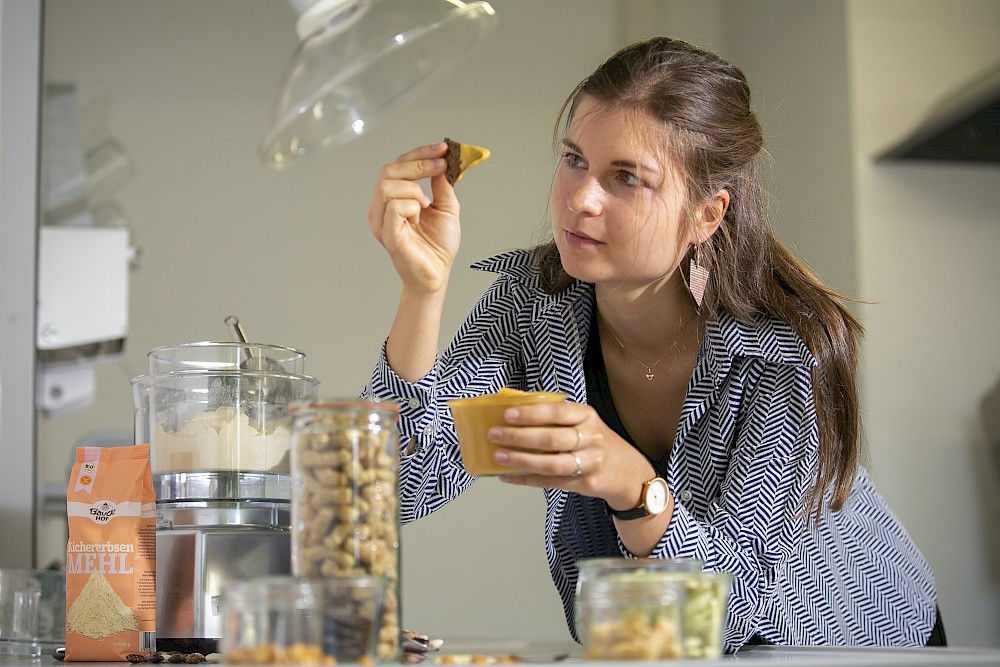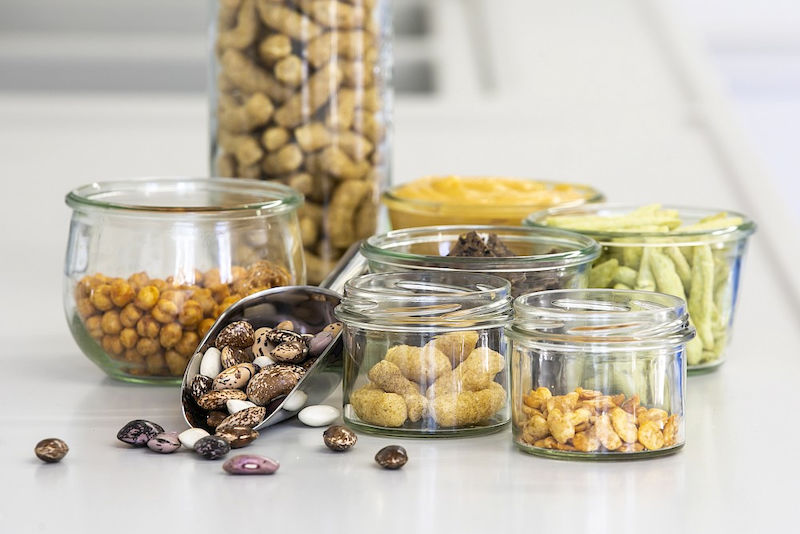Peas with a twist

It's time for their daily brainstorming session. Hülsenreich’s small team sits in front of the board on which is written a chain of terms that whet the appetite: Chickpea sweet potato jalapeno, for example. Or red lentil tomato chilli and white bean spinach sesame. Recipes that will later be used to create new dips for dipping black bean tortilla chips. “We are currently experimenting with an avocado-free guacamole,” says Emilie Wegner.
The development of another product is further along, driven forward in recent months at the small start-up on the Weinberg Campus: crispy cajun and curry-flavoured chickpeas and field beans, also available coated in chocolate. These will soon be launched on the market as Hülsenreich’s initial products. “We have experimented a lot,” says the 23-year-old founder, who together with Simon Vogt and Gunnar Schulze, forms the core team at Hülsenreich.
Some of the experiments were conducted in the laboratory of the Ideas Incubator, made possible by MLU's Transfer and Start-up Service. This gives students or employees who are interested in setting up a company a hands-on opportunity to perfect their own ideas. There is also a twin-screw extruder in which the pre-developed recipes can be processed into chips using pressure and heat. “These were excellent conditions for us,” says Emilie Wegner, “because they enabled us to produce smaller quantities of our products under industry-like conditions.”
Born in Berlin, Wegner has always been a fan of good food. During a year abroad in New Zealand, she lived with a nutritionist whose enthusiasm inspired her to eat healthily. As a result, Emilie Wegner began writing a food blog in which she published her own recipes. She then began studying nutrition science at MLU, graduating with a bachelor’s degree in 2017.
But how do you go from being a graduate to the founder of a company? “If I don't know something, I want to try it out,” says Emilie Wegner. One day, while in search of new ingredients for her experimental kitchen, she discovered chickpeas. She ordered a ten-kilo sack of chickpea flour off the Internet. “They didn’t sell smaller packages, so I had to figure out what to do with it.” The result were savoury puddings, quiches and crackers, all based on chickpeas. The latter were so delicious that Emilie Wegner was increasingly asked where her creations could be purchased. This inspired her to found her own company.
Armed with a tin full of chickpea crackers, she presented her idea to the MLU Transfer and Start-up Service as early as 2016. They were quite receptive to her idea and helped her to take the next steps. The company's feasibility had to be checked, a business plan had to be drawn up, a laboratory and backers had to be found, and financial funding opportunities had to be examined. Finally, the company succeeded in obtaining start-up funding from the EU. This enabled Emilie Wegner and her team to be employed as scientific researchers at MLU until April 2019. “This meant we could look after our project without any pressure,” she says.
And things are taking shape. The company will officially launch in May, and the products are expected to be sold online and in the first organic food stores in Halle starting in June. This will be followed shortly thereafter by initial listings with two retail chains. The Hülsenreich team has already achieved a lot of success: In December 2018, it received the state’s Hugo Junkers Award in the category “Most innovative projects in the food industry”, which comes with prize money totalling 10,000 euros. The Hugo Junkers Award is conferred every year to outstanding research and innovation projects in Saxony-Anhalt. Awarding a total of 80,000 euros, it is the state’s most highly endowed award. It was awarded in four categories in 2018.
Emilie Wegner believes in her idea and her product. The fibre content of legumes is extremely high. “Word has gotten out,” she says. And in terms of sustainability, legumes are an excellent source of a healthy diet. After all, they thrive in their native regions and are relatively simple to grow. According to Emilie Wegner: “These are major advantages that will become increasingly important in the future.”
Emilie Wegner
Hülsenreich
Telephone + 49 151-59114799.
email: hallo@huelsenreich.de
Further articles
Food of the future
Nutrition research at MLU is broad-based. It goes far beyond the boundaries of traditional disciplines, because its subject matter is as extensive as it is complex. The scientists are working on counteracting the progression of diseases through targeted changes in nutrition. Read more
Uncovering the secrets of fat cells
Professor Martin Gericke investigates inflammatory reactions in adipose tissue. One aspect he is investigating is why not all obese people suffer from typical diseases of affluence associated with obesity, such as high blood pressure and diabetes. Read more

